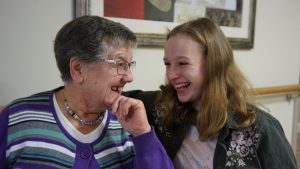 ‘Reading between the lines’ is about looking for meaning that is implied rather than explicitly stated. It’s an important skill when caring for someone living with dementia. In last month’s Zoom meeting we discussed how understanding the message behind the behaviour helps the person with dementia. Most of us feel that it’s something we’re not very good at, but when we look back on past ‘normal’ conversations we can see that we not all that bad, actually! When we’re out shopping with a friend and she says, ‘that looks like a good coffee shop over there,’ we know that she’s really saying is, ‘let’s go and have a coffee.’ Answering the meaning beneath the spoken words is a skill that helps caregivers cope with a loved one’s repeated questioning.
‘Reading between the lines’ is about looking for meaning that is implied rather than explicitly stated. It’s an important skill when caring for someone living with dementia. In last month’s Zoom meeting we discussed how understanding the message behind the behaviour helps the person with dementia. Most of us feel that it’s something we’re not very good at, but when we look back on past ‘normal’ conversations we can see that we not all that bad, actually! When we’re out shopping with a friend and she says, ‘that looks like a good coffee shop over there,’ we know that she’s really saying is, ‘let’s go and have a coffee.’ Answering the meaning beneath the spoken words is a skill that helps caregivers cope with a loved one’s repeated questioning.
Speaking at a conference, Welsh preacher Geoff Thomas told how his mother, a descendent of the Welsh revival, would ask repeatedly, ‘is there a meeting tonight?’ She loved going to meetings and would go every night of the week if she could. Answering yes or no wasn’t sufficient: she would repeat the question. But what if she really meant was, ‘you won’t forget to take me to the meeting, will you?’ ‘I’ll always remember to take you with me when there’s a meeting, Mam,’ might have worked better.
I read about a man who was answering his wife automatically, and had sort of tuned out, when she said sharply, ‘I didn’t hear what you said then! What was it?’ He couldn’t remember so he turned and said to her, ‘only that I love you!’ And was rewarded with a big smile. Emotions are higher when cognition has lessened.
Ask the Holy Spirit to help your understanding. Two friends and I drove from Holland to Romania one year and our car broke down in a rutted country lane in Hungary just before we reached the Romanian border. We were driving slowly when hot, black oil splattered all over the windscreen. After the bonnet had cooled, we opened it and found black oil all over the engine. Amazingly we found a repairs garage a little further along, and limped in, praying fervently. The garage man saw immediately what the problem was, and cannibalised a gasket from his stock to fit our engine. He thoroughly cleaned the windscreen and the bonnet. And he wouldn’t take any money for it, asking us to send milk chocolate when we got back home because his two sons had never tasted it. He wrote down his name and address, and we did send him two boxes of the best chocolate bars we could find. The miracle is he spoken only Hungarian, and between us we only had English, French, and Arabic. Yet as we drove away we realised we had understood one another. Every time I write this story I check with my friend that I am remembering it correctly.
Caring for someone with dementia can be so challenging that we can forget what God can do. We forget that His Holy Spirit has promised to never leave us or forsake us. A friend told me how his mother suddenly came back to herself after listening to a small devotion from ‘Worshipping with Dementia.’ The person reading to her told him what a joy it was to be able to communicate with her again, even if only for a short time. These incidents remind us that the person remains – and knowing the person makes such a big difference. Home manager Janet Jacob told me of a resident who would empty every drawer in her room and pile the contents on her bed. It made extra work for the carer who had to put them back. But then Janet remembered that this resident had been the wife of a diplomat and had travelled frequently, so she put a suitcase in the room and the resident continued to unpack the drawers happily and put the contents neatly into the suitcase.
It helps to be warm and positive. ‘When is my next appointment?’ may really mean, ‘I’m anxious that I’ll forget the time of my next appointment and I’ll miss it.’ The best answer isn’t simply to give the time of the appointment, but to add, ‘Don’t worry, I’m coming with you and I’ll make sure we get there on time.’ Or, ‘when is my Dad coming home from work?’ when he’s been gone for many years, with, ‘you know how much your Dad loves you! You told me he often works overtime.’
It is a joy when you ‘hit the right spot,’ because you know you’ve built the person’s sense of wellbeing, and are giving the correct treatment for the condition. And don’t forget, when you’ve found the right answer you can repeat it again and again, and it will be as fresh to him or her as as the first time you gave it. It’s all about love and reassurance.














